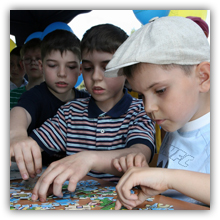Navigation and Service
Jump to:
Child Participation in Monitoring and Evaluation

Child participation is a fundamental right as well as a sound practice in monitoring and evaluation; if children are likely to have been affected by an initiative, then it makes sense to consult them in order to determine why, how and to what extent. It is important to recognise that children are not a homogeneous group – children of different genders, ages and socio-economic circumstances may have been affected in different ways so that a representative sample of those children affected needs to be identified. International lessons learned demonstrate that child-protection outcomes improve when children’s opinions are listened to.
Including children in monitoring and evaluation processes as respondents is essential. Children can also be consulted on the identification of key evaluation questions, they can act as data collectors with their peers and they can be involved in data analysis and the validation of findings and conclusions, alongside adult stakeholders. To play these roles, children may need extra support from adults, in keeping with their age and evolving capacities.
- include children as a primary data source
- specify the sample of child respondents (who, how many, how representative)
- clarify the extent of children’s involvement (as respondents, as data collectors, in analyzing the data)
- include ethics considerations for children’s participation (how informed consent, confidentiality and security of children will be assured).
Find more information in the LIBRARY under the tag "Participation".
